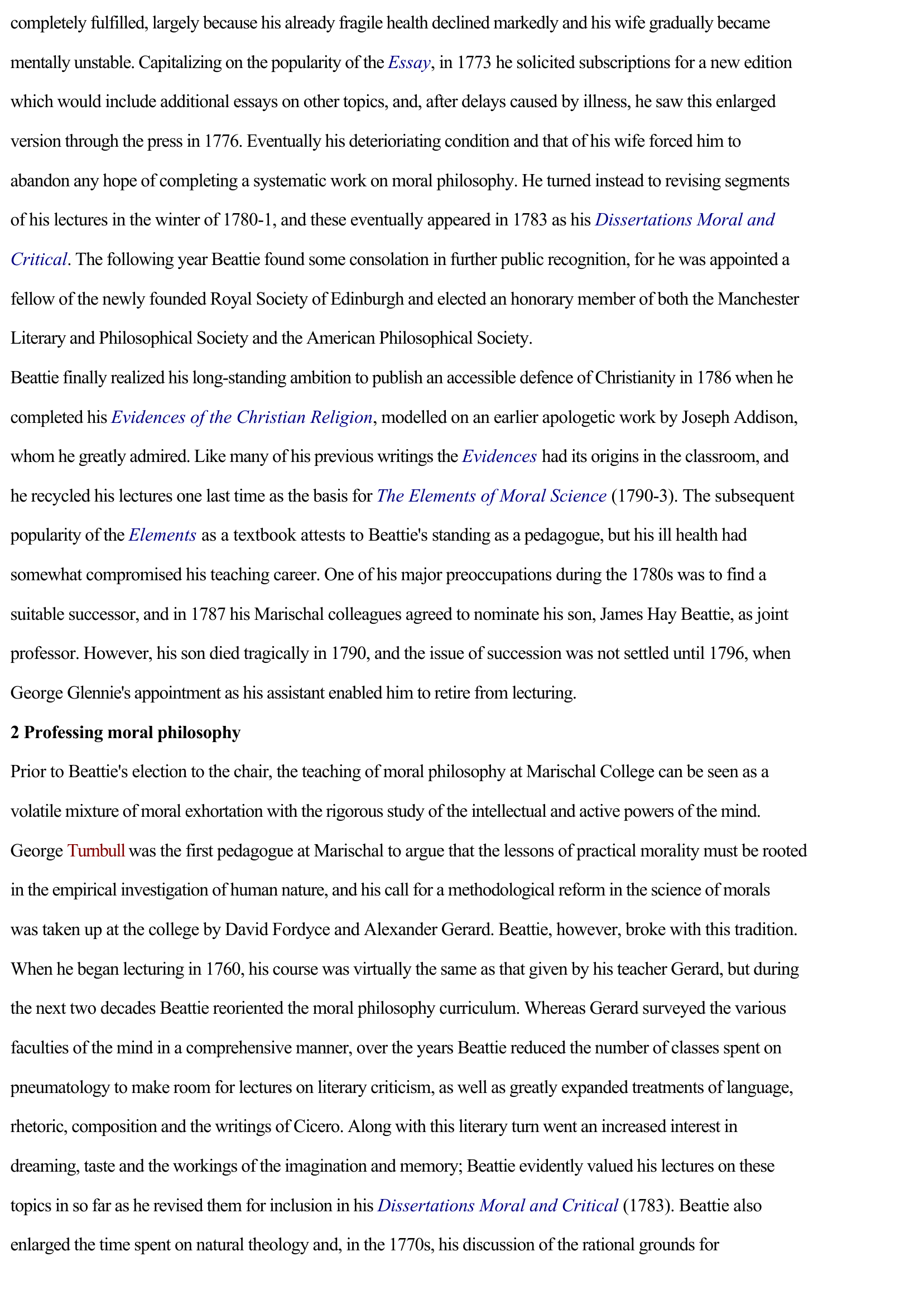Beattie, James
Publié le 22/02/2012
Extrait du document
«
completely fulfilled, largely because his already fragile health declined markedly and his wife gradually became
mentally unstable.
Capitalizing on the popularity of the Essay , in 1773 he solicited subscriptions for a new edition
which would include additional essays on other topics, and, after delays caused by illness, he saw this enlarged
version through the press in 1776.
Eventually his deterioriating condition and that of his wife forced him to
abandon any hope of completing a systematic work on moral philosophy.
He turned instead to revising segments
of his lectures in the winter of 1780-1, and these eventually appeared in 1783 as his Dissertations Moral and
Critical .
The following year Beattie found some consolation in further public recognition, for he was appointed a
fellow of the newly founded Royal Society of Edinburgh and elected an honorary member of both the Manchester
Literary and Philosophical Society and the American Philosophical Society.
Beattie finally realized his long-standing ambition to publish an accessible defence of Christianity in 1786 when he
completed his Evidences of the Christian Religion , modelled on an earlier apologetic work by Joseph Addison,
whom he greatly admired.
Like many of his previous writings the Evidences had its origins in the classroom, and
he recycled his lectures one last time as the basis for The Elements of Moral Science (1790-3).
The subsequent
popularity of the Elements as a textbook attests to Beattie's standing as a pedagogue, but his ill health had
somewhat compromised his teaching career.
One of his major preoccupations during the 1780s was to find a
suitable successor, and in 1787 his Marischal colleagues agreed to nominate his son, James Hay Beattie, as joint
professor.
However, his son died tragically in 1790, and the issue of succession was not settled until 1796, when
George Glennie's appointment as his assistant enabled him to retire from lecturing.
2 Professing moral philosophy
Prior to Beattie's election to the chair, the teaching of moral philosophy at Marischal College can be seen as a
volatile mixture of moral exhortation with the rigorous study of the intellectual and active powers of the mind.
George Turnbull was the first pedagogue at Marischal to argue that the lessons of practical morality must be rooted
in the empirical investigation of human nature, and his call for a methodological reform in the science of morals
was taken up at the college by David Fordyce and Alexander Gerard.
Beattie, however, broke with this tradition.
When he began lecturing in 1760, his course was virtually the same as that given by his teacher Gerard, but during
the next two decades Beattie reoriented the moral philosophy curriculum.
Whereas Gerard surveyed the various
faculties of the mind in a comprehensive manner, over the years Beattie reduced the number of classes spent on
pneumatology to make room for lectures on literary criticism, as well as greatly expanded treatments of language,
rhetoric, composition and the writings of Cicero.
Along with this literary turn went an increased interest in
dreaming, taste and the workings of the imagination and memory; Beattie evidently valued his lectures on these
topics in so far as he revised them for inclusion in his Dissertations Moral and Critical (1783).
Beattie also
enlarged the time spent on natural theology and, in the 1770s, his discussion of the rational grounds for.
»
↓↓↓ APERÇU DU DOCUMENT ↓↓↓
Liens utiles
- La Pensée et le mouvant de H. Bergson « sur le pragmatisme de William James » - commentaire
- James Joyce: "Ulysse"
- DANS LA CAGE (résumé & analyse) Henry James
- Le personnage de Leopold BLOOM de James Joyce
- DAISY MILLER (résumé & analyse) Henry James


